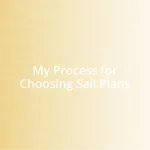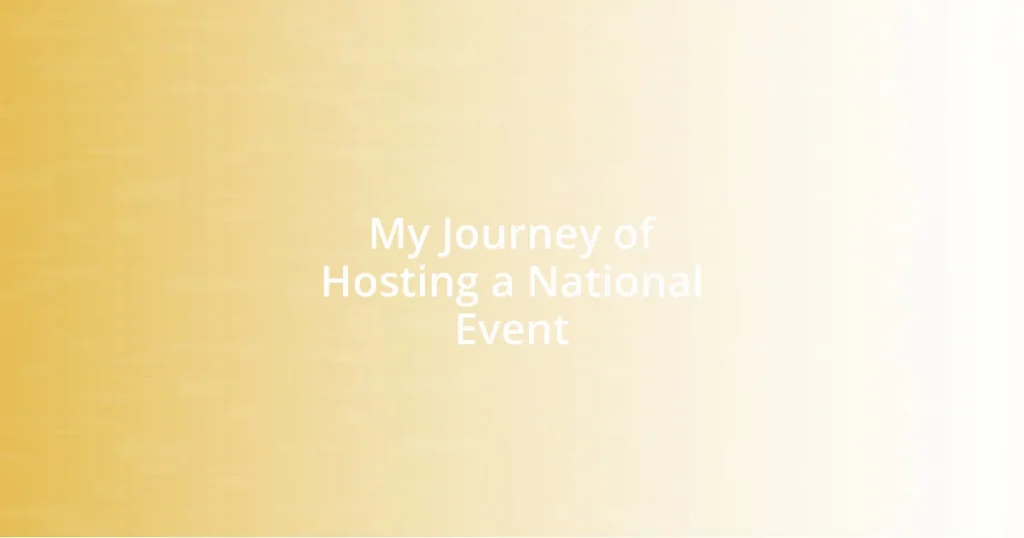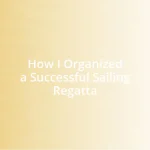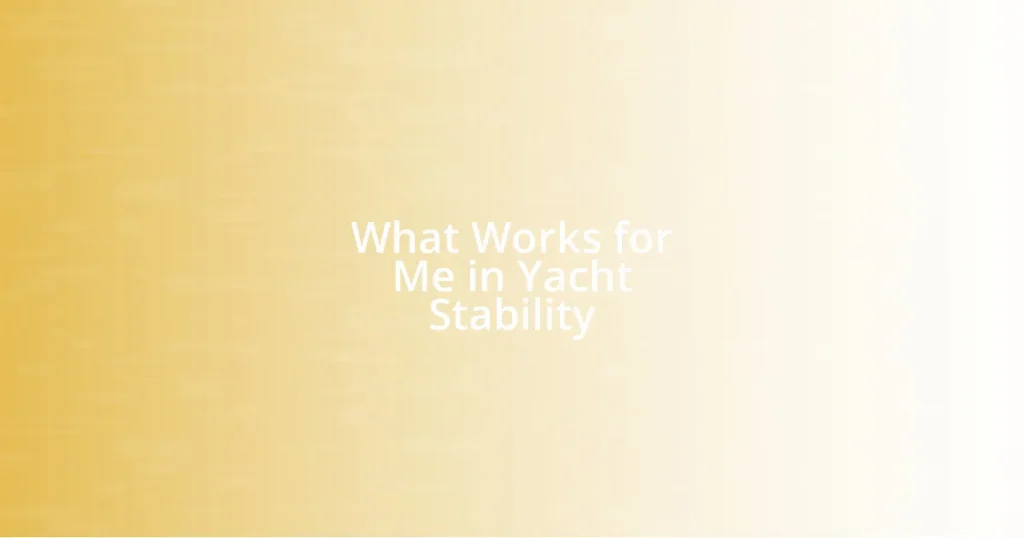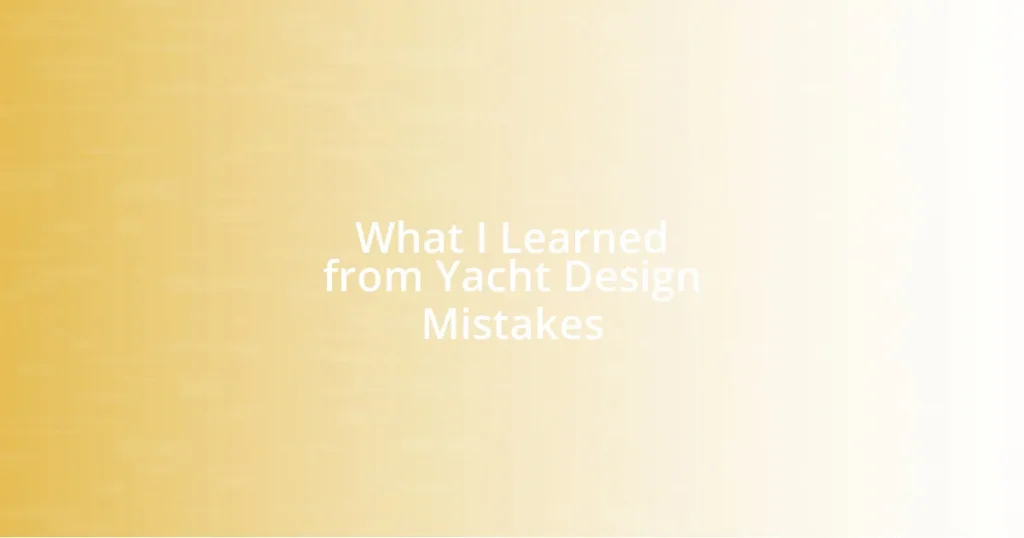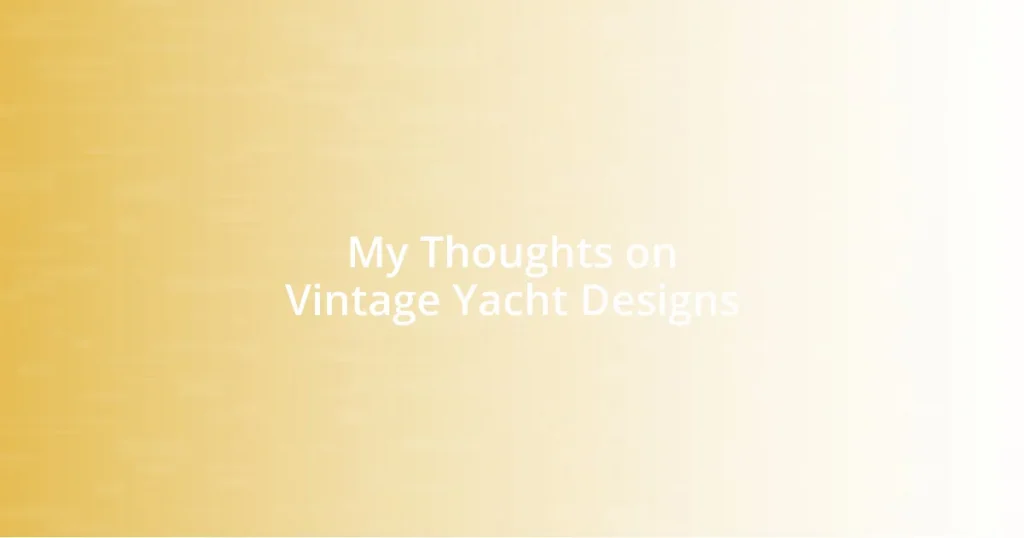Key takeaways:
- Hosting events creates meaningful connections and can fulfill a desire to engage communities.
- Selecting the right event type based on audience interests and demographics enhances participation and satisfaction.
- A successful event team requires diverse skills, passion for the mission, and effective communication to execute plans smoothly.
- Evaluating success through attendee feedback and storytelling reveals the true impact of events beyond attendance metrics.
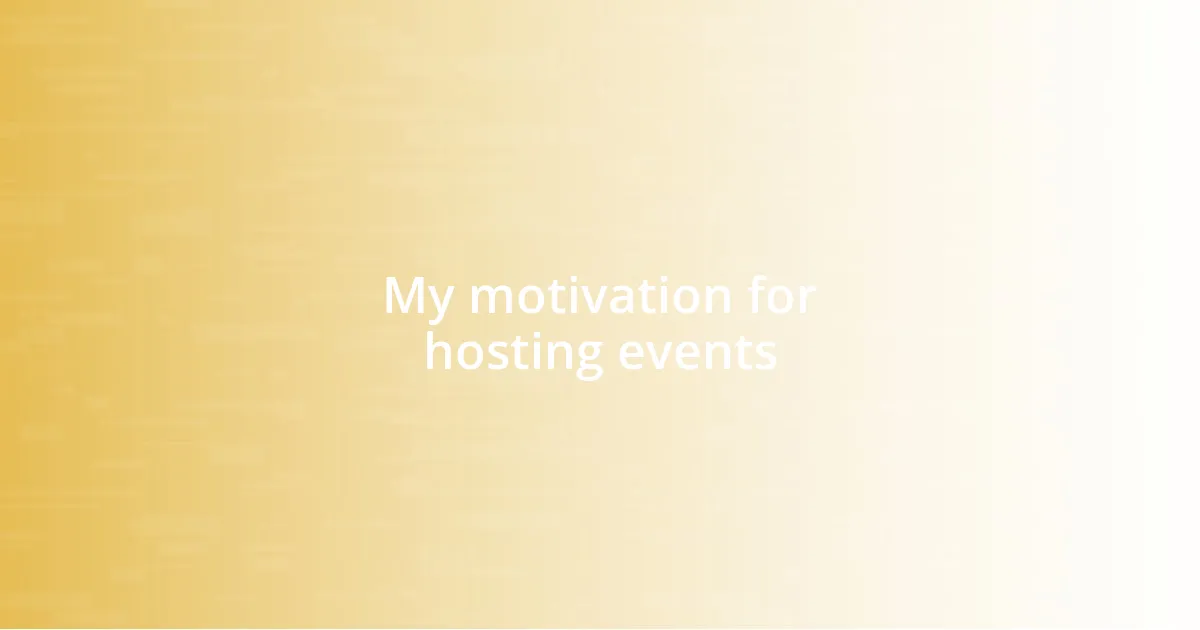
My motivation for hosting events
When I first decided to host events, it stemmed from my deep-seated desire to create connections. I remember attending a local festival where strangers became friends over shared laughter and experiences. Isn’t it fascinating how an event can bring people together in ways that daily life often cannot?
I realized that hosting events could be my way of lighting that spark in others. The rush I felt when seeing attendees engage and connect was unparalleled; it was as if I was a conductor, orchestrating moments of joy and understanding. How often do we find spaces where genuine interactions flourish?
Moreover, the thrill of turning a vision into reality has always fueled me. I recall spending countless nights brainstorming ideas and refining details, driven by the thought of how amazing it would feel to see my ideas come alive. It made me wonder, isn’t the journey of planning an event just as exhilarating as the event itself?
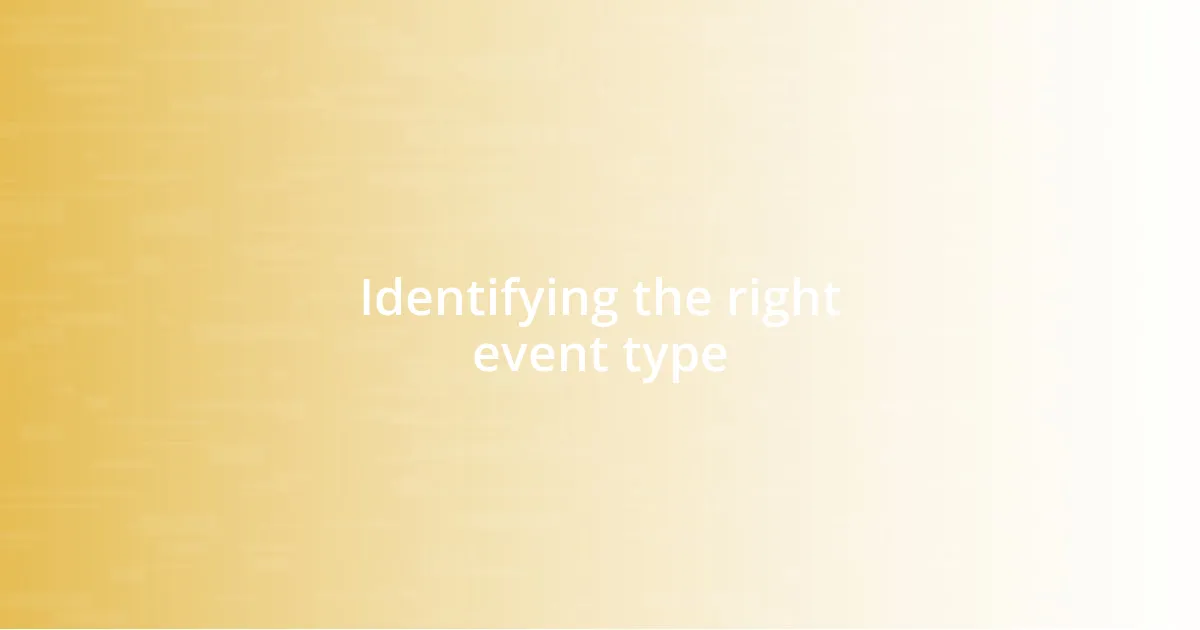
Identifying the right event type
When I started thinking about the right event type, I found that it was crucial to align my vision with the audience’s interests. For example, I once considered organizing a tech conference, but after conducting surveys and engaging with potential attendees, it became clear they were more excited about a community art festival. This experience highlighted how the right choice can energize a community and foster deeper connections.
In my journey, I learned to assess resources carefully. Choosing an event type also depends on factors like budget, venue availability, and local support. For instance, while planning a music festival, I realized that securing sponsorship could make or break the event. Thorough research and understanding of local dynamics made the planning process smoother and more effective, which further fueled my passion for hosting.
Ultimately, recognizing the demographics of attendees was a game changer for me. My first formal event was aimed at young professionals looking to network, but I quickly learned that events can cater to various age groups and interests. Catering to the right demographic not only enhances participation but also makes the event memorable and meaningful.
| Event Type | Audience Engagement |
|---|---|
| Tech Conference | Usually attracts tech-savvy individuals seeking knowledge and networking opportunities. |
| Community Art Festival | Engages all demographics, encouraging creativity and local pride. |
| Music Festival | Broad appeal, tapping into diverse age groups for entertainment and social connections. |
| Networking Event | Specifically targeted to young professionals, fostering professional connections. |
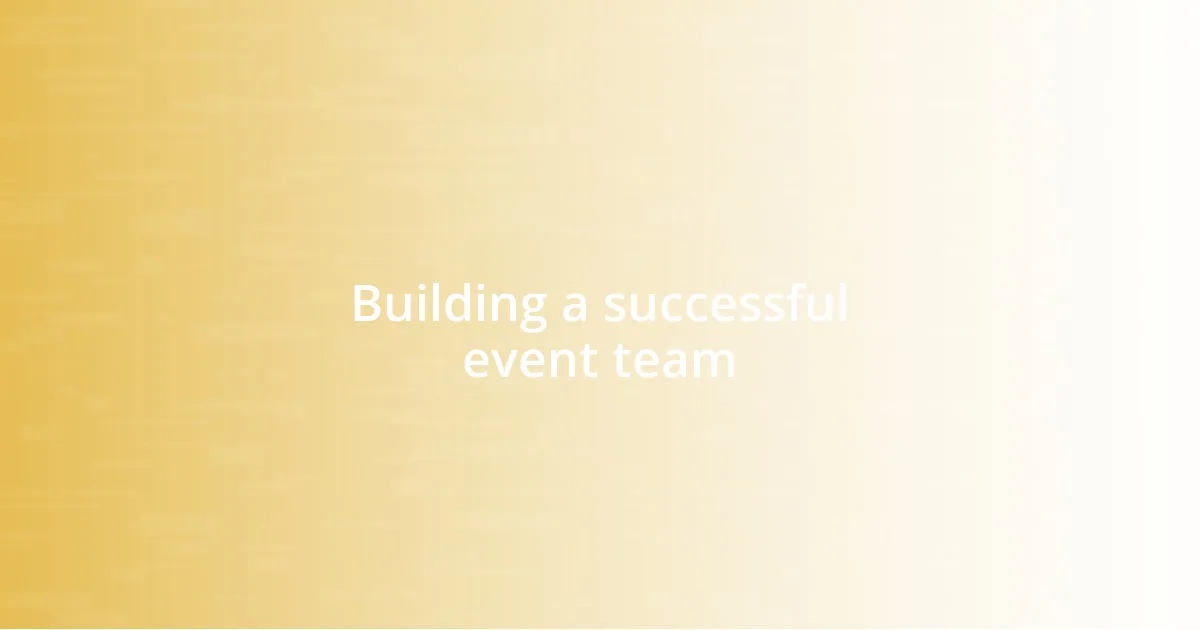
Building a successful event team
Building a successful event team is essential for any gathering’s success. In my experience, finding individuals who are not only skilled but also passionate about the event’s purpose can make a world of difference. I once assembled a team for a charity gala where each member brought their unique strengths. One was a whiz at social media, while another had a knack for securing sponsorships. This blend of talents enhanced the planning process, fostering an environment of creativity and collaboration.
Here are some key traits I prioritize when building my event team:
- Passion: Team members who truly believe in the event’s mission.
- Diversity of Skills: A mix of expertise ensures all aspects of the event are covered.
- Effective Communication: Open lines of dialogue help resolve issues quickly.
- Reliability: Dependable individuals who can be trusted to execute their tasks.
- Flexibility: Team members who can adapt to changes and unexpected challenges with ease.
No matter how good the plan looks on paper, having the right people by my side to bring it to life has always been what truly elevates an event.
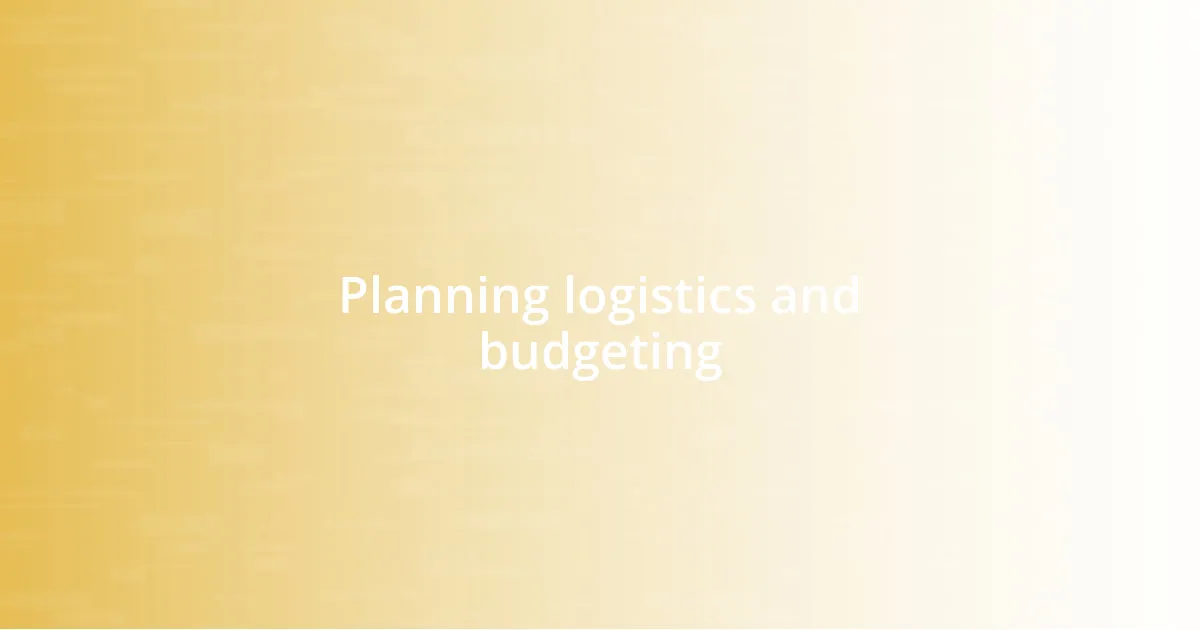
Planning logistics and budgeting
Planning logistics and budgeting for a national event can feel overwhelming, but breaking it down helps immensely. I remember budgeting for a large-scale educational summit, where I initially underestimated venue costs. It struck me how essential it was to include all potential expenses—like permits, catering, and transportation—right from the start. I learned that having a detailed budget not only keeps your finances in check but also allows for unexpected costs.
When it comes to logistics, I’ve found that meticulous organization is key. For a recent cultural fair I organized, I created a checklist of all logistics—venue setup, sound equipment, and even safety protocols. Each time I checked an item off, I felt a wave of relief and accomplishment. And let me tell you, addressing potential challenges early, like arranging for extra parking or ensuring accessible entrances, can save you a lot of headaches on the event day. How often have you encountered a minor issue that turned into a major headache simply because it wasn’t anticipated? I’ve been there, and it taught me that proactive planning is the cornerstone of successful logistics.
I’ve also come to appreciate the importance of flexibility within your budget. Once, while organizing a workshop series, I discovered a sudden increase in printing costs for materials. It would have derailed me had I not set aside a contingency fund. I always recommend building that safety net into your budget—having a buffer can be a game changer when the unexpected arises. Ultimately, the key is to blend thorough planning with the ability to adapt, ensuring everything runs smoothly while keeping the budget intact.
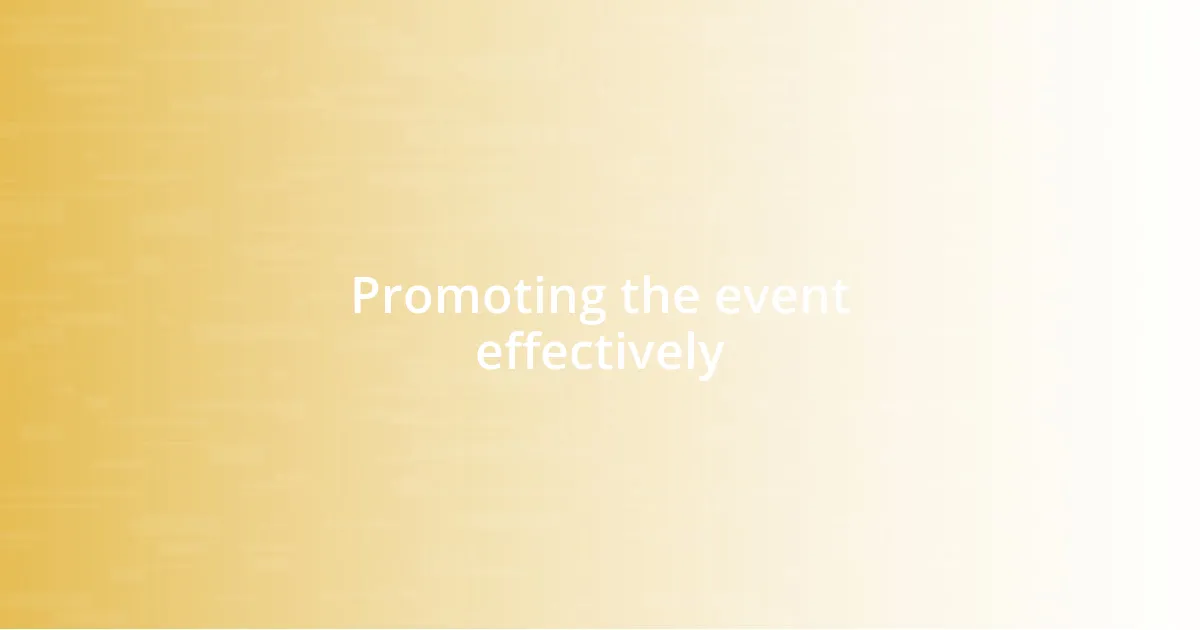
Promoting the event effectively
Establishing a clear and engaging promotional strategy is crucial for any national event. I remember feeling both excited and a bit daunted when I launched the social media campaign for an international conference I was hosting. Crafting eye-catching content and utilizing targeted ads significantly increased our event’s visibility. I often ask myself, how can we cut through the noise in today’s digital landscape? The answer lies in understanding our audience and delivering messages that resonate with them.
Consistency is key when promoting an event. Releasing regular updates not only keeps everyone informed but also creates anticipation. For instance, I once shared behind-the-scenes photos and sneak peeks leading up to an art exhibition. The excitement from attendees was palpable, and even weeks later, people were still talking about it. Engaging with potential attendees through polls or questions can also foster a sense of community—after all, who doesn’t love feeling included in the planning process? Reflecting on these strategies, I felt a genuine connection with our audience that translated into higher attendance and enthusiasm.
A well-planned promotional timeline can streamline efforts and ensure maximum reach. During the planning for a food festival, I created a timeline that mapped out key promotional milestones. From press releases to countdown posts, each action felt purposeful. This not only kept the momentum going but also made me feel more organized—who wouldn’t want that? Having measurable goals, like ticket sales targets or social media engagement rates, also helps to assess what works. It’s rewarding to check off each success, and trust me, celebrating those small victories can really boost morale across your team!
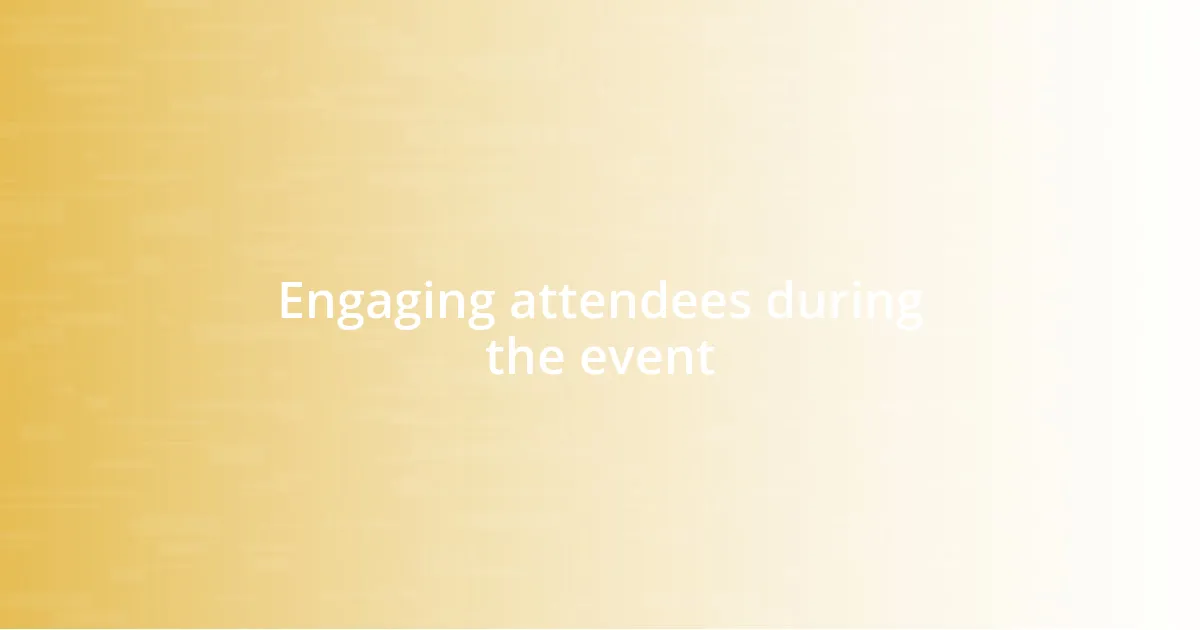
Engaging attendees during the event
Engaging attendees during the event is where the magic truly happens. I once attended a conference where the host had set up interactive workshops that encouraged participation. It transformed the atmosphere completely; instead of passive listeners, everyone felt like they were part of something larger. Isn’t it amazing how a simple change in format can elevate the entire experience?
In my own experience, incorporating technology—like live polls and event apps—has been a game changer. At a leadership summit I organized, we used an app that allowed attendees to submit questions in real-time, which the speakers addressed during their sessions. The energy in the room skyrocketed as people saw their inquiries being discussed, making them feel valued and connected. I always wonder, how can we leverage technology to create these meaningful interactions? It’s all about finding that balance between online and offline engagement.
I also believe in the power of surprise elements to keep the excitement alive. At a recent networking event, we had a surprise guest speaker who was well-known in our industry. The buzz generated by that revelation was electric! Attendees were engaged and eager to interact not just with the speaker but with each other. Think about this: how often do we underestimate the thrill that spontaneity can add to an event? My takeaway is that a little unpredictability can create memorable interactions, making your event truly unforgettable.
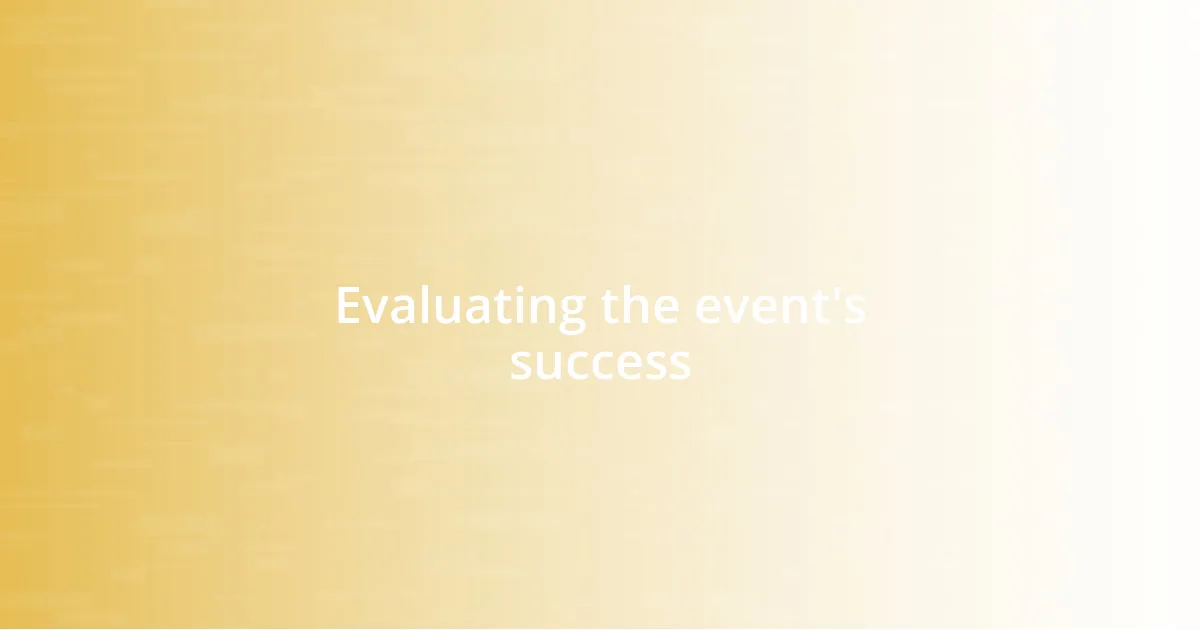
Evaluating the event’s success
Evaluating the success of a national event can be both exciting and nerve-wracking. After hosting a major seminar, I sat down with my team to analyze feedback. I remember feeling a mix of pride and relief when the majority of attendees expressed satisfaction, confirming we had hit the mark. How can you best gauge success if not through the voices of those who experienced it?
Metrics like attendance numbers and social media mentions are essential, but they only scratch the surface. For instance, post-event surveys revealed that many valued the networking opportunities more than the presentations themselves. Reflecting on this, I realized that understanding these priorities is pivotal for future planning. What if we focused even more on fostering those connections next time?
Additionally, I’ve found that storytelling plays a massive role in measuring success. A colleague once shared how a simple conversation at our event led to a partnership that benefited her organization tremendously. Hearing her story made me appreciate the ripple effect of hosting events. Isn’t it heartening to consider how shared experiences can spark collaborations and friendships that last well beyond the event itself? It’s these emotional connections that really tell us whether we succeeded.








